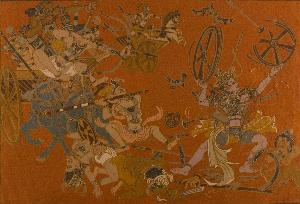Nandlal Boshu
Nandlal Boshu;Nandalal Bose
Place: Haveli Kharagpur
Born: 1882
Death: 1966
Biography:
Early Life and Career
Nandalal Bose, a renowned Indian artist, was born on December 3, 1882, in a middle-class Bengali family in Haverli Kharagpur, Munger district, Bihar. His interest in art began at an early age, and he later pursued it as a career, despite initial disapproval from his family. Nandalal Bose joined the Calcutta School of Art, where he was influenced by the murals of the Ajanta Caves. He became part of an international circle of artists and writers seeking to revive classical Indian culture. This association led to his involvement in the non-violence movement, as marked by his 1930 black on white linocut print of Mahatma Gandhi walking with a staff.
Artistic Style and Contributions
Nandalal Bose's artistic style was characterized by his "Indian style" of painting, which blended traditional Indian and Persian influences. His works include scenes from Indian mythologies, women, and village life, earning him recognition as one of the pioneers of modern Indian art. Some notable works by Nandalal Bose include:
- A Lion (59 x 63 cm, National Gallery of Modern Art, New Delhi, Tempera) - [https://Wikioo.org/@@/D3ZHUE-Nandlal-Boshu-A-Lion](https://Wikioo.org/@@/D3ZHUE-Nandlal-Boshu-A-Lion)
- Dhol Wala (59 x 63 cm, National Gallery of Modern Art, New Delhi, Tempera) - [https://Wikioo.org/@@/D3ZGTG-Nandlal-Boshu-Dhol-Wala](https://Wikioo.org/@@/D3ZGTG-Nandlal-Boshu-Dhol-Wala)
- Pranam (50 x 55 cm, National Gallery of Modern Art, New Delhi, Tempera) - [https://Wikioo.org/@@/D3ZGTA-Nandlal-Boshu-Pranam](https://Wikioo.org/@@/D3ZGTA-Nandlal-Boshu-Pranam)
Legacy and Recognition
Nandalal Bose's contributions to Indian art are immense. He was given the task of illustrating the Constitution of India and was recognized by the Archaeological Survey of India in 1976 as one of the "nine artists" whose work is considered an "art treasure." Today, the National Gallery of Modern Art in Delhi holds over 7,000 of his works. Important Links: * Nandalal Bose's biography on Wikipedia - [https://en.wikipedia.org/wiki/Nandalal_Bose](https://en.wikipedia.org/wiki/Nandalal_Bose) * Nandlal Boshu's artworks on Wikioo.org - [https://Wikioo.org/@/Nandlal-Boshu](https://Wikioo.org/@/Nandlal-Boshu)














